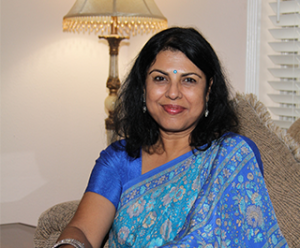She is an award-winning and bestselling author, poet, activist and teacher of writing. Her work has been published in over 50 magazines, including the Atlantic Monthly and The New Yorker, and her writing has been included in over 50 anthologies, including The Best American Short Stories, the O.Henry Prize Stories and the Pushcart Prize Anthology. Her books have been translated into 29 languages, including Dutch, Hebrew, Bengali, Russian and Japanese, and many of them have been used for campus-wide and city-wide reads. Several of her works have been made into films and plays. She lives in Houston with her husband Murthy and has two sons, Anand and Abhay, who are in college. She loves to connect with readers on her Facebook page.
I am still working on the Sita novel – it is a very challenging one, and I want to be able to handle it right, and bring out the complexity of the main character. I hope to finish writing the book by early 2018.
I have so many favorite books and writers that it is very hard to choose the top five. I would say that perhaps they are Tagore, Margaret Atwood, Mahasweta Devi, Tolstoy, and Tolkien (for his Lord of the Rings).
Currently I’m reading a nonfiction book, The Gene by Siddhartha Mukherjee.
It takes about two years. First, I do the research. Then I tried to take notes about the characters and a basic plot outline. Then I get started. I revise a lot, so by the end often many important elements of the story have changed and become something quite different.
__________________________________________________________________________
To connect with the author :
Website: chitradivakaruni.com Facebook: http://www.facebook.com/chitradivakaruni
